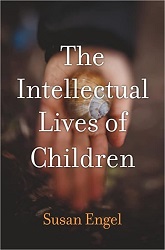
Review posted October 25, 2022.
Harvard University Press, 2021. 219 pages.
Review written September 6, 2022, from a library book
How do children form ideas? When do they become able to think abstractly? What is going on in their heads when they ask questions? When do they learn to imagine? When do they learn to invent? How can we support kids' ability to form ideas?
This book by a developmental psychologist explores all these questions. Many examples are given, and we're told about experiments done to determine what things change as a child ages.
It was refreshing and surprising to read a book focusing on children's thought processes. Here's a section from the Prelude:
While children are busily gathering information, mulling things over, and speculating about the world, the adults around them are, for the most part, unaware of all that mental activity. Much of the time, they treat children as if they don't have ideas at all. Focused on whether children are learning to behave well, acquiring skills and facts, and feeling happy, they give little consideration to children's thoughts, or the puzzles that intrigue them.
And anyone who is around children can help nurture their ideas. This is also from the Prelude:
Outstanding capacity and extraordinary opportunity are not essential for toddlers and preschoolers to grow into children and adults who pursue ideas. Far more important is the sheer time and attention a child gives, and is encouraged to give, to the consideration of ideas. Every child can learn that building ideas is as tangible, accessible, and alluring as making things with modeling clay. It begins with opportunities to collect information -- whether about candy, movie stars, or oceans. And it begins in every kitchen, sidewalk, and kindergarten.
The main chapters are "Inquiry," "Invention," and "Ideas." Reading them helped me realize how much goes into a child's thought processes. The final chapter, "The Idea Workshop," talks about making space for groups of kids to create and generate ideas, along with some amazing examples.
I'll be honest. It took me an awfully long time to get through this book. There is small print and long chapters, and the writing is dense. I was going to describe it as academic, and then I noticed it's published by Harvard University Press, so of course it is! All those things are true, but when I would sit down and focus on the book, it was fascinating. There are plenty of stories of children and their ideas, and they made me think about my own experience with children. So mainly I think my slowness to finish was more about not taking the time to pick up the book than it was being interested once I'd done that.
And I do recommend this book for parents and teachers and anyone who works with children. It will get you thinking about where ideas come from.
